|

(store window, Eastern Europe)
Gyorgy Kepes
c1930
_______________________
I’ll Be Watching You: NSA Surveillance and the Male Gaze
Autumn Whitefield-Madrano
The New Inquiry
(....)
I’m trying to think of how I’d process the news that our “for the people, by the people” government can invade our privacy anytime it damn well pleases, if I hadn’t ever internalized the sensation of being observed. I imagine I’d be more surprised, for starters, but I also wonder if I’m asking the wrong question here. As humans, we love little more than to watch each other in a variety of ways (is TV anything other than controlled people-watching?). Men are observed too—differently than women are, but it’s not like men are entirely unaware that they’re being seen by others. Here I turn to Robin James, Ph.D., associate professor of philosophy at UNC Charlotte: “I’m thinking that (properly masculine, i.e. white, etc.) men experience surveillance in profoundly enabling ways,” she wrote to me when I asked her to expand on a Twitter exchange we had. “[B]eing watched by someone who you know is your equal (that is, you watch them, they watch you in return) is what reaffirms both of your statuses as equals, as subjects, etc. If your gaze isn’t returned in kind, that means you’re not considered an equal, that you’re not seen as a real member of society.”
All emphasis there is mine, and for a reason: The point isn’t that women don’t observe men, or that men don’t observe one another, but that the quality of the gaze is different. I don’t walk down the street and feel like I have less cultural weight than my male peers. But when you’re 12—the age I was when I heard my first catcall from an adult man, and my young age here is hardly unusual—you do have less cultural weight, you do have less power. You learn early on to associate being observed for your femininity with powerlessness, and that’s not an easy mind-set to shed. (Which is exactly why street harassment has long been an effective tool of oppression, but that’s another story.) Broad strokes here: Men don’t have that experience. Rather, they didn’t until it came out that the National Security Agency—a greater power than virtually every man in the country—could watch you whenever they pleased.
...(more)
_______________________

Myth Approaches 3
The Eye's Mind
2008 - 2009
Olivia Parker
1 2
_______________________
Kafka's Fish
Mark Bowles
There is a beautiful line in Kafka, which helps to gloss what I mean by Beckett’s prose as a kind of gasping, a kind of breathing (but not an imitation of the rhythm of breathing or of gasping):
I live only here and there in a small word in whose vowel (‘thrust’ above, for instance) I lose my useless head for a moment. The first and last letters are the beginning and end of my fishlike emotion.
The soul lights up and flickers only in language, in the shapes traced on the page, or the voice traced in the silence of the head. Each clause is the catch in breath of this fish-like soul.
_______________________

Gate
György Kepes
1948
_______________________
Police State Canada:
Communications Security Establishment Canada (CSEC) Runs Massive Domestic Spying Program
Keith Jones
Global Research
On the basis of secret government directives, Canada’s national security apparatus is conducting mass surveillance of Canadians parallel to, if not directly patterned after, the domestic spying operations of the U.S. National Security Agency (NSA).
Communications Security Establishment Canada (CSEC), the NSA’s Canadian counterpart and longstanding partner, has been scrutinizing the metadata of Canadians’ electronic communications since at least 2005.
Moreover, the NSA routinely provides Canada’s security agencies with intelligence on Canadians and CSEC reciprocates by providing U.S. intelligence officials with information about people living in the U.S. This arrangement allows both agencies to circumvent legal bans on warrantless surveillance of their own citizenry’s communications.
(....)
The extent and scope of CSEC’s spying and who is being targeted and why are all zealously guarded state secrets. The CSEC functions under secret directives issued by the Minister of Defence—directives whose very existence is unknown to parliamentarians, let alone the public at large.
(....)
The CSEC is part of a growing state within the state whose operations are hidden from the public. Till this week most Canadians had never heard of the CSEC and even now they knew very little about its activities. When Defence Minister MacKay renewed by secret ministerial order CSEC’s authorization to spy on Canadians’ electronic communications in November 2011 he issued six other secret ministerial directives to CSEC—none of whose subject let alone contents has been publicly revealed.
As in the United States, Canada’s elite has used the so-called war on terror to justify Canada’s participation in a series of imperialist wars, massively expand the national-security apparatus, and adopt laws that attack core democratic rights.
...(more)
PRISM, pipelines and the trouble with the surveillance state
Rick Salutin
'I've Got Nothing to Hide' and Other Misunderstandings of Privacy
Daniel J. Solove
_______________________

Lights
György Kepes
1938
György Kepes 1906 - 2001
A Master of Image and Information
Alice Rawsthorn
_______________________
First Monday Volume 18, Number 6
Social networking sites' tracking of unintentionally shared information
Rath Kanha Sar, Yeslam Al-Saggaf
Abstract
Various pieces of information are being shared online while users browse the Internet. Previous studies have demonstrated that as social networking sites (SNS) became popular, the information being leaked or shared is becoming more personal (including names and e-mail addresses). Users’ information is being shared or leaked from visited sites (both SNS and non-SNS) to third party sites (such as advertisers) in a number of ways including via the HTTP header. The intent of this study is identify the privacy implications of browsing the Internet within a single browsing session of a group of commonly visited sites (both SNS and non-SNS) doing activities common among most online users. We analysed the HTTP headers resulting from the first author’s browsing and reported on the types of information being shared or leaked, and to whom. We observed that within just a single browsing session of some sites, both the user’s identifiable and non-identifiable information are being leaked to various third party sites and also propagated to more than just one level of third party site. We also found that some SNS are also able to track user’s browsing activities not only within the SNS but also beyond it -particularly among web sites that use SNS widgets.
Access, accommodation, and science: Knowledge in an “open” world
Ashley Rose Kelly, Meagan Kittle Autry
Abstract
The rising popularity of open access (OA) publishing in scholarly communities is purportedly leading to increased public knowledge. At least, that’s a key piece of the OA moral argument. This is especially true for discussions of scientific research. We argue, however, that while there have been significant moves to provide better material/technological access to research, OA advocates must still tackle the issue of making original scientific research conceptually accessible. Despite being freely available on the Internet, articles are not also by default linguistically, conceptually, or ideologically accessible to the global public(s) they are intended to reach. In this article, we examine how OA coupled with innovative scientific communication practices can help align the ideals of OA with the realities of complex, specialized genres of writing to provide better, more “open,” access to research. We look to PLOS ONE and the PLOS Blog Network to discuss how the innovative material access of PLOS ONE coupled with the communication strategies of PLOS Bloggers can work together toward more openly accessible original scientific research articles.
_______________________
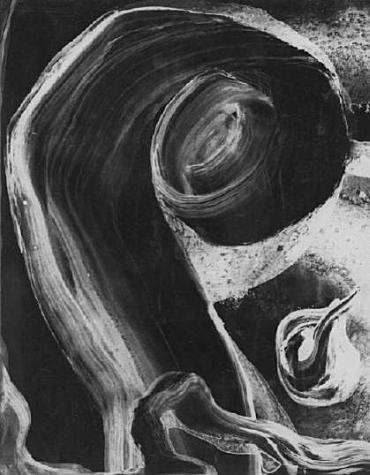
Abstraction #3
Gyorgy Kepes
1939
_______________________
Reinventing Progressive Politics in Canada
Murray Dobbin
(....)
The tragic irony in all this is that in most democracies the majority of people actually share values that, if they drove government policy, would begin to address the crises. But there is a persistent disconnect between what people want and what the system can deliver. The multi-party system is designed to be dominated by money and increasingly sophisticated marketing, micro-targeting and data-mining. Disengaged citizens haven’t a prayer in dealing with the modern election machine.
Left wing parties try to play this game but inevitably come up short. The “game” has been designed not to represent the needs of people or communities but to manage capitalism in the interests of the elites. As soon as you accept the rules of this game, that is what you end up doing. The electoral contest is inherently corrupting of genuine democracy.
(....)
It all has to do with recovering community and the commons. The destruction of community has been the great success of the right. When Margaret Thatcher stated there was “no such thing as society” she was not describing current reality — she was describing her goal. It has been largely achieved in English-speaking developed countries. If we are to even begin to address our share of the global crises we will have to do it by creating a political culture that reinvents the commons and ends people’s isolation from each other.
...(more)

Nacimiento
(1948)
Olga Costa
d. June 28, 1993
_______________________
Bordering on madness
A review of Bhanu Kapil’s 'Schizophrene'
Lauren Russell
(....)
In the introductory “Passive Notes,” Kapil explains how Schizophrene was assembled from the handwritten draft she had discarded, thrown into the garden to be buried in snow. “[B]efore the weather turned truly warm,” she writes, “I retrieved my notes, and began to write again, from the fragments, the phrases and lines still legible on the warped, decayed but curiously rigid pages”(i). Thus Schizophrene is a palimpsest, a text constructed from successive layers and erasures. In a work spanning three continents, the juxtapositions of narrative fragments and the placement of space mark border crossings, as reoccurring images of maps and grids document movements, locations, and violence, the relative positions of bodies.
...(more)
_______________________

Marcus Behmer
(1879–1958)
from Ver Sacrum
circa 1900
50 Watts
_______________________
Finnegans Wake: Losing Control In Book Iii Iii
Jane Lewty
Hypermedia Joyce Studies
At the 18th Joyce symposium in Trieste, I delivered a paper entitled 'The Tale of HCE and EVP' which not merely defended the auditory facets of Finnegans Wake and the presence of radio within the text, but audaciously proposed that the Wake may be read in a very specific way--a reading reliant upon our chronological distance as readers, and awareness of ourselves as, like Joyce, "privileged interpreters of a media-driven age."
Communication with the dead is the paradigm for all mediated communication; shown by our continuous attempt to receive a report from else-where, whether it be a message in a bottle, dead letters sent, a phongraph recording, or, for these purposes, the electroacoustic seance. Electric Voice Phenomenon (referred to as EVP) was initiated after World War II by Latvian psychologist Konstantin Raudive, who apparently detcted voices of a paranormal origin by means of a 'cat's whisker' diode, a device used in early radio crystal sets. In further experiments, the static disturbance of interfrequency radio wavelengths was thought to contain these "voice-entites", all of whom spoke in a distinctively rapid and polyglot language, indeed "[...] in universal, in polyglutteral, in each auxiliary neutral idiom [...] ereperse and anythongueatall" (FW 117. 11-15). I discovered that the concept of EVP was, if anything, airborne, in the early 20th century; it should not be disregarded that in September 1925 a group of psychics met in Paris to dabate 'Wireless Talks With the Spirit World' during the week that Joyce returned to the city from Archachon, having suffered a painful bout of conjunctivitis. Wishing to continue with the Wake, he "put off" his necessary eye operation until the 'last watch' of Shaun was in progress (FW pp. 555-90). It may be extreme for one to assume that Joyce was aware of--and capitalised upon--the psychics' conference, although the Shaun section of the Wake (pp. 403-590) is notable for its "electrickery in attendance" (FW 579. 6) and I have analysed it accordingly.
A more certifiable fact is that Joyce was directly exposed to the dyadic nature of radio, which promised a mutual rapport but delivered confusion. Whilst formulating his ear-culture and "picking up airs" from Radio Eireann, Joyce confessed he heard voices from the past--hallucinatory, far-flung pieces of a previous life seeping into his Paris apartment through static. Such interference repeatedly barred access to 'home' on the dial, often crafting false words out of white noise. Certainly, Joyce was subjected to the abnormality of radio, and correspondingly crafted a vocabulary equal to any duplicitous broadcast signal. It is pertinent that he claimed not to "believe in any science" which implies that specific developments, in his opinion, had never reached their potential.3 For example, language which coursed freely through wires was hardly liberating, it was often inarticulate or directed to the wrong portal. Any sender is analogous to the dead who--as shown in spiritualist writings--sign through a glass darkly, perhaps speaking in tongues or finding that their words are garbled in transit.4 Throughout Finnegans Wake, I contest that Joyce returns radio to its source--enhancing the initial desires of early wireless pioneers such as Oliver Lodge and even Guglielmo Marconi, who imagined their devices might provide contact with alternative planes of existence.5 On one level, Joyce utilises wireless technology to re-call the ghosts hovering behind his written words who may mean something else; essentially he attempts to write the speech of an invisible multitude ever present in the ghostliness of any radiophonic spectrum.
...(more)
_______________________

Storm
Victor Higgins
b. June 28, 1884
_______________________
We’ll Fling Our Books
Sibel Oral
Translated by Feyza Howell
words without borders
(....)
I am not writing these lines to ask the world for help, to ask that you hear, or do something for us. We don’t need help. Millions of people resisting in many cities of this country need no help. Because they are the people; we are the people, and in this struggle for freedom we’ve begun side by side, shoulder to shoulder, we realized we needed help from no one. We derive our power from our own free will, and our faith in freedom.
I am writing these lines, because I—a journalist and a writer of this country—want to make one thing clear: our literature was always rich and powerful, and now, it will only become stronger still, after all we’ve been through. It won’t take much more than a few years before this resistance, this will of the people, and these experiences will come before us in short stories and novels as tales from the heart, tales of a genuine search for freedom and democracy. Turkey will never forget these days of the resistance, and it won’t be just history books, but also our literature that will have so much to say…
Cesare Pavese says, "Literature is a defense against the attacks of life." Mario Vargas Llosa says, "Literature is an act of rebellion." Even if every last act of resistance in Turkey came to a complete halt, our writers and readers would make sure resistance will live on in all art forms.
And we shall fling our novels, poems, and short stories at that glasshouse in Sabahattin Ali’s short story.
...(more)
_______________________

Arboleda
Olga Costa
_______________________
David Harvey – Seventeen Contradictions and the End of Capitalism
back door broadcasting video
... explore the way capital works, how systemic contradictions are socially and spatially constructed, and ask whether these contradictions and inequalities generate new political and cultural pathways beyond capitalism.
Over the last four decades David Harvey has illuminated a new geographical and cultural understanding of the way capitalism operates. Beyond his extraordinary scholarly contributions however perhaps what is equally remarkable is the public reach of his writing and teaching. David Harvey’s recent online lecture courses and interventions not only reassert the legacy of Marx’s theory, his work inspires something quite new – a spirit of autodidactism, organic learning and a sense that the public realm is a field of education and political optimism.
Prior to David’s talk Louis Moreno of University College London’s Urban Laboratory will consider some of the ways in which David’s body of work provides a fresh starting point for a creative and practical response to a new era of civil unrest and geo-political uncertainty.
via synthetic_zero
_______________________
Capitalism as Religion
Walter Benjamin
scribd
_______________________
From The Dialogues Of Bobagorus: Cinema Purgatorio
Brad Zellar
Your Man For Fun In Rapidan
(....)So you are saying, Meers, that time is also like a magician, or a jeweler who displays his wares?
A magician, yes, and perhaps also a bit of a jeweler.
That's all good and fine, Meers. I appreciate your answers. I am, however, going to ask you to imagine something which it is my great hope you never have to actually experience. I have reason to believe that time is, in fact, nothing less than the world's most confounding cinema. At all times in this cinema films are being projected on both the front and back walls, and on the side walls, on the floor and ceiling, and in every nook and cranny; different films projected at different speeds. One simply cannot hope to take it all in, and even more impossible is the fact that each of these films is composed of millions of films, one superimposed on top of another. For does not each of us have an utterly unique relationship with time? Do we not each have our own histories and dramas, each with its own pace, incidents, and cast of characters? Then, of course, there is the shared course of human history and life on this planet. There is the past. There is this moment. And there is the future. And every one of these broad concepts means something different --and many different things-- to each of us. In effect, then, what you have is a sprawling cosmic cinema that is constantly and simultaneously screening quiet dramas, great tragedies, news reels, crime sagas, comedies, love stories, documentaries, action adventures, and science fiction.
...(more)
_______________________

caboose
photo - mw
_______________________
Talks About William Gaddis
Conjunctions Audio Vault
mp3
Samuel R. Delany
Francine Prose
Rick Moody
Bradford Morrow

Midnight Pass Road
1975
Philip Guston
(June 27, 1913 – June 7, 1980)
_______________________
Book of Absence [pdf]
Rebecca Hazelton
Darlings, the forest is disappearing. Not the one you remember,
with the little girl and her basket and the wolf astride,
but the one that surrounded your small house as a child
and was smaller than you realized, the forest
you planned to run into and never out of if someone
didn’t understand you and soon. There are fewer trees,
if trees there ever were, and not the roots of some slumbering,
and the trees are cellphone towers, disguised
and blunting the beaks of woodpeckers, vibrating
other animals that would burrow with our conversations
in their small maws. Darlings,we have been talking overmuch
and the forest is disappearing....(more)
Pleiades
Volume 33, Number 1
_______________________
"Drone
Wars"
The CTheory seminar on Drone Wars was held at the Pacific Centre for
Technology and Culture on June 5th, 2013. The seminar includes short
presentations, discussion and a new video by Jackson 2bears, "After
the Drones."
DRONE WARS
----------
The increasing use of drones as a tactical military strategy deployed
in the "War on Terror," raises three questions of urgent significance
for contemporary political and social theory. First, as Judith Butler
has noted in Frames of War one of the primary division lines of
contemporary politics involves "bodies that count" and, conversely,
bodies that don't count. In this case, the deployment of drones as a
military strategy might be viewed as premised on a prior moral
calculation concerning whose bodies are deemed grieveable and thus
worthy of remembrance and those rendered, in effect, ethically
invisible. Second, while drone warfare involves sophisticated
cybernetic technologies, it also involves a prior ontological
understanding concerning the existence of good and evil in the world.
For example, President Obama's justification for the use of military
violence in the exercise of the "Just War" is explicitly based on a
public rhetoric supporting an absolutist conception of evil. Third,
the seemingly widespread acceptance of drones for purposes ranging
from surveillance, targeting and exploration is, in the end, perhaps
less a novel technological development than one which indicates a
fundamental change in human subjectivity. In this case, perhaps
drones can be so acceptable because we have passed beyond human
subjectivity into something very different, still unexplored, namely
a new form of subjectivity anticipated in the writings of Martin
Heidegger, Peter Sloterdijk, and Jean Baudrillard.
_______________________

photo - mw
_______________________
Sensing Distance: The Time and Space of Contemporary War
Caren Kaplan
(....)... my premise is that even when war is presumed to be at a far distance or even unknown to conscious thought, it may still be felt or perceived throughout everyday life. Emphasis on something I am learning to lean towards: felt, sensed. This affective dimension of distant war in everyday life operates somewhat paradoxically since feeling suggests connection--one feels something about something or someone else even if only in relation to oneself but also in relation to others. Thus, war at a distance, rather than only structuring relations of separation or false consciousness or repression (see no evil, hear no evil, speak no evil--to which I would add, hey that means I do no evil!) creates modes of connection and possibilities of admittedly uneven but discernible links. If we follow John Law and Ruth Benshop's argument that all representations create divisions, we can only understand these connections to be uneven, asymmetrical networks of power and politics, but linked nonetheless. This recognition invites us to trace, apprehend, recognize networked connections--but lightly. Sometimes the best protection is to remain unperceived or camouflaged. In this formulation I am refusing the argument that distance leads to alienation via objectification. Objects may very well bring us together. That is, ontological politics open up the very bitter situation in which we are immersed.
...(more)
_______________________
Driftless Review
Issue 1.0 (Spring 2013)
_______________________
Sensate
A Journal for Experiments in Critical Media Practice
Issue 1.0 (Spring 2013)
... a peer-reviewed, open-access, media-based journal for the creation, presentation, and critique of innovative projects in the arts, humanities, and sciences.
_______________________

For M.
Philip Guston
1955
_______________________
Clarice Lispector: The Archer (A Part of the Future)
presented by Tom Clark
(....)
I'm going to die: there's that tension like that of a bow about to loose an arrow. I remember the sign of Sagittarius: half man and half animal. The human part in classical rigidity holds the bow and arrow. The bow could shoot at any instant and hit the target. I know that I shall hit the target.
Now I'm going to write wherever my hand leads: I won't fiddle with whatever it writes. This is a way to have no lag between the instant and I: I act in the core of the instant. But there's still some lag. It starts like this: as love impedes death, and I don't know what I mean by that. I trust in my own incomprehension that gives me life free of understanding, I lost friends, I don't understand death. The horrible duty is to go to the end. And counting on no one. To live your life yourself. And to suffer as much to dull myself a bit. Because I can no longer carry the sorrows of the world. What can I do when I feel totally what other people are and feel? I live them but no longer have the strength. I don't want to tell even myself certain things. It would be to betray the is-itself. I feel that I know some truths. But truths have no words.
...(more)

photo - mw
_______________________
the blog and turfs and the brandywine bankrompers
-- Booms of bombs and heavy rethudders?
-- This aim to you!
-- The tail, so mastrodantic, as you tell it nearly takes your own mummouth's breath away. Your troppers are so unrelieved because his troopers were in difficulties. Still let stultitiam done in veino condone ineptias made of veritues. How many were married on that top of all strapping mornings, after the midnight turkay drive, my good watcher?
-- Puppaps. That'd be telling. With a hoh frohim and heh fraher. But, as regards to Tammy Thornycraft, Idefyne the lawn mare and the laney moweress and all the prentisses of wildes to massage him.
-- Now from Gunner Shotland to Guinness Scenography. Come to the ballay at the Tailors' Hall. We mean to be mellay on the Mailers' Mall. And leap, rink and make follay till the Gaelers' Gall. Awake ! Come, a wake ! Every old skin in the leather world, infect the whole stock company of the old house of the Leaking Barrel, was thomistically drunk, two by two, lairking o' tootlers with tombours a'beggars, the blog and turfs and the brandywine bankrompers, trou Normend fashion, I have been told down to the bank lean clorks? Some nasty blunt clubs were being operated after the tradition of a wellesleyan bottle riot act and a few plates were being shied about and tumblers bearing traces of fresh porter rolling around, independent of that, for the ehren of Fyn's Insul, and then followed that wapping breakfast at the Heaven and Covenant, with Rodey O'echolowing how his breadcost on the voters would be a comeback for e'er a one, like the depredations of Scandalknivery, in and on usedtowobble sloops off cloasts, eh? Would that be a talltale too? This was the grandsire Orther. This was his innwhite horse. Sip?
-- Well, naturally he was, louties also genderymen. Being Kerssfesstiydt. They came from all lands beyond the wave for songs of Inishfeel. Whiskway and mortem! No puseyporcious either, invitem kappines all round. But the right reverend priest, Mr Hopsinbond, and the reverent bride eleft, Frizzy Fraufrau, were sober enough. I think they were sober.
— Finnegan's Wake (Chap. 3.2)
_______________________
The Accidental Bricoleurs
Rob Horning
n + 1
(....)
In some ways, the fast-fashion companies are developing into post-brands—the apotheosis of the democratization of the designer label and the ready-to-wear revolution. Their lasting contribution to consumerism may be that they have excused themselves from the increasingly clamorous public sphere, already teeming with advertising, to make way for the budding personalities of their customers. Fast fashion itself is perhaps best understood as a kind of social medium, a communication channel that the companies attempt to administer in order to extract regular profits.
Facebook and other social-media companies have a similarly parasitic business model. They also appropriate the content and connections we generate as we recreate our identities within their proprietary systems, and then repurpose that data for marketers who hope to sell tokens of that identity back to us. Much as fast-fashion companies are routinely accused of pirating designs, Facebook continually oversteps once sacrosanct norms of privacy, opting users in to data-divulging mechanisms by default and backpedaling only when confronted with public outcry. It offers a space akin to the fast-fashion retailer’s changing room for the ritual staging of the self, inviting users to seize upon “stylistic elements” from wherever they can be grabbed. We become involuntary bricoleurs, scrambling to cobble together an ad hoc identity from whatever memes happen to be relevant at the time.
Like fast fashion, social media have brought with them a profusion of means and ways to reshape and display our identity. Constantly given new tools to share with, always prompted to say something new about ourselves (“What’s on your mind?” Facebook asks thoughtfully), we are pressured to continually devise ingenious solutions to our identity, which suddenly appears to be a particular kind of recurring problem: one that can be solved by replenishing social media’s various channels with fresh content. Just as fast fashion seeks to pressure shoppers with the urgency of now or never, social media hope to convince us that we always have something new and important to say—as long as we say it right away. And they are designed to make us feel anxious and left out if we don’t say it, as their interfaces favor the users who update frequently and tend to make less engaged users disappear. One can easily fall out of fashion with the algorithms Facebook uses to select which content users see out of the plethora of material friends in their network contribute.
Social media teach us to seize potential signifiers of the self from any available source and spend our energy promoting them as attention-worthy. In this way, they actually abet and are abetted by the insidious creep of design ideology—the assumption that we can choose a desktop image to express our inner being or that housework will be less like drudgery with a tasteful dustpan and broom set. By coating consumer culture detritus with an aesthetic veneer, design ideology helps makes the idea of a self anchored in fonts and Uniqlo tolerable. Armed with the auric criteria of design, we can regard goods and ads and memes on websites as a rich source of inspiration (“Hey, these old Newport ‘Alive with pleasure!’ T-shirts are neat, think I’ll riff on that logo for my Facebook profile picture!”), not as an inescapable blight.
...(more)
_______________________
 sifting sand
Armand Guillaumin
d. June 26, 1927
_______________________
Monsters University: the Aftermath
Kieran Healy
Monsters University, the prequel to Monsters, Inc, opened this weekend. I brought the kids to see it. As a faculty member at what is generally thought of as America’s most monstrous university, I was naturally interested in seeing how higher education worked in Monstropolis. What sort of pedagogical techniques are in vogue there? Is the flipped classroom all the rage? What’s the structure of the curriculum? These are natural questions to ask of a children’s movie about imaginary creatures. Do I have to say there will be spoilers? Of course there will be spoilers. (But really, if you are the sort of person who would be genuinely upset by having someone reveal a few plot points in Monsters University, I am not sure I have any sympathy for you at all.) As it turned out, while my initial reactions focused on aspects of everyday campus life at MU, my considered reaction is that, as an institution, Monsters University is doomed.
...(more)
_______________________

The Promenade
Mario Carreño
1913 - 1999

Table by a Window
1917
Jean Metzinger
b. June 24, 1883
_______________________
Soundtrack: On Listening To Barber's Adagio For Strings After Seeing The First Firefly Of The Summer
Brad Zellar
(....)
It sounds like a young man staring at photographs of his childhood and unable to identify or remember the smiling man with whom he is time and again pictured.
It sounds like an old man alone at a kitchen table, moving photographs around with his trembling fingers as if they were chess pieces, or like another old man in his basement, sitting in the darkness and watching home movies of laughing children.
...(more)
_______________________
The Child and its enemies
Emma Goldman
Mother Earth, Vol. 1 No. 2, April 1906
_______________________
Are Young People Labeled as Disruptive Really Showing Healthy Resistance?
Bruce E. Levine
(....)
My experience as a clinical psychologist for almost three decades is that many young people labeled with psychiatric diagnoses are essentially anarchists in spirit who are pained, anxious, depressed, and angered by coercion, unnecessary rules, and illegitimate authority. An often-used psychiatric diagnosis for children and adolescents is oppositional defiant disorder (ODD); its symptoms include “often actively defies or refuses to comply with adult requests or rules” and “often argues with adults.”
(....)
... my experience is that most rebellious young people diagnosed with mental disorders do not, and so they become excited to hear that there is actual political ideology that encompasses their point of view. They immediately become more whole after they discover that answering “yes” to the following questions does not mean that they suffer from a mental disorder, but instead have a certain social philosophy:
Do you hate coercion and domination?
Do you love freedom?
Are you willing to risk punishments to gain freedom?
Do you instinctively distrust large, impersonal and distant authorities?
Do you think people should organize themselves rather than submit to authorities?
Do you dislike being either an employer or an employee?
Do you smile after reading the Walt Whitman quote “Obey little, resist much”?
Young people who oppose inequality and exploitation, reject a capitalist economy, and aim for a society based on cooperative, mutually owned enterprise are essentially left-anarchists—perhaps calling themselves “anarcho-syndicalists” or “anarcho-communitarians.” When they discover what Noam Chomsky, Peter Kropotkin, Kirkpatrick Sale, or Emma Goldman have to say, they may identify with these thinkers. These young people have a strong moral streak of egalitarianism and a desire for social and economic justice. Not only are they not mentally ill but, from my perspective, they are the hope of society.
...(more)
_______________________

Arbres et Maisons
Jean Metzinger
1920
_______________________
Coming-Of-Age Poem Using 50 Words That Might Cause The NSA To Flag You As A Terrorist
Martin Ott
His impatient mother would place her mace in an indigo
purse, and badger him, “Slow-poke the artichoke,”
for preferring Reno to the college snuffle, beef market
of lacrosse tossers, Jello shots, and credit card fraud.
...(more)
_______________________
a possible history of oblivion
Jackie Orr
(....)
"Long-term problems of embodiment within capitalism, in the zoning of the everyday, the work of getting through it, and the obstacles to physical and mental flourishing, are less successfully addressed in the temporalities of crisis and require other frames."
--Lauren Berlant, "Slow Death"[
As theory lags behind you could say it's time to pay up the bill's come due the situation that requires it, the party's over the song's arrested the sorrow's hit the back of the stage and slopped over a pervasive atmospherics of precarity into the queen's next of kin takes hold through the mundane repetitions salvaging little but the bark--turgid, intermittent--of doom you will say she's at wit's end of commodity purchase, disposal, and replacement. In contrast to the increasingly standardized processing of disaster-events the dark she longed to script against the beat of her wildest and public dreaming through digital now wrapped round templates of crisis news and humanitarian response, her sloped shoulders knitted shawls of stumbling shame hurried pen and no taste for sense longing longing for what was and will not be what cannot remember the slow catastrophe of repetitious wasting, of ordinary time itself wearing thin and human and non-human worlds bearing depleted signs of exhaustion what cannot have what broke my [ ] what stalled my [ ] what seized this leverage to forge over and over in the dullest seems to have not yet found a language for expression, much less public reckoning. repetition of nonsense an old, buried, rambled, wounded, enervated, sorrowing, laggard, happenstance of history you could call the biographics of pubic intent, the costumed ball of rigorous evasion the sulking word games the ergonomic supports the wide swath of destructions never cut never cut by any tell-tale storm
How to pursue that reckoning and that language? the chide and the backslide How to perform a tactical lamentation for a time beyond the wasted time of an exhausted, dispersed apocalypse?
...(more)
_______________________

Sailboats
Jean Metzinger
1912
_______________________
Commodification
Angela Mitropoulos
s0metim3s
‘Commodification’ is often used as a short-hand way of defining what capitalism does, but all too often it’s used as a synonym for transaction or exchange. Yet buying and selling are not specific to capitalism and, more importantly, there are consequences in organising a critique of, or opposition to capitalism on the grounds that ‘markets’ are bad.
(....)
Marx’s sense of the dialectic (as it was I think for Deleuze) is not two, but three. And instrinsic to the machinery of value. By which I do not mean class plus gender plus race, but the relation of a foundationalist concept of Nature (sexual difference, but biological concepts of Nature more generally, and therefore race) to time, particularly with respect to concepts of origin and future that assign values to particular properties and their transmission through time and space. All concepts of race require a concept of sexual reproduction, and the ‘reproduction of races’ hinges on normative concepts of their reproduction. Just as, it might be added: all concepts of sex and sexuality require a concept of race, even if this tries to anchor in the idea of the ‘human race,’ or species, constantly in fear of slipping down the slope of infinite regress and … ‘What next!? People marrying animals?!’
In other words, genealogy. In any event, it seems to me that the three-fold dynamics of dialectical forms are easily established, from Lockean liberalism (with its three temporal orders of the contract) to Marx’s critical diagram of political economy: exchange value, surplus value, value. The crucial ‘third term,’ the specificity of capitalism, is surplus value, not commodification.
...(more)
_______________________

Withdrawing Veils of Sound II
(2010)
Mary McIntyre
via
_______________________
the new french philosophy
Richard Marshall reviews The New French Philosoph by Ian James
3am
(....)
Ian James sets out to show that in the new French philosophy the idea of ‘new’ is its subject, where new is understood in terms of ‘rupture’ and ‘discontinuity’ and ‘novelty.’ The French philosophers wonder how the new is possible. Gilles Deleuze started this in the 1960’s in his philosophy of ‘difference.’ Lyotard, Derrida and Foucault continued. Lyotard’s ‘event’ seeks to explain how discourses are contested and thinking is transformed. Jeff Malpas thinks this ‘the founding moment of any postmodernism.’ Lyotard’s ‘The Different’ is defined as an instability in language and discourse. It is supposed to create ‘new addressees, new addressors, new significations and new referents’ and ‘new phrase families and new genres of discourse.’ Derrida’s late ‘Spectres of Marx’ is about going beyond existing research programmes, ‘… beyond any possible programming, new knowledge, new techniques, new political givens.’ Foucault talks about epistemic breaks as an ‘event’ in ‘The Order of Things.’ He asks, ‘ how is it that thought has a place in the space of the world, that it has its origin there, and that it never ceases to begin anew?’ He suggests a process that ‘… probably begins with an erosion from the outside, from a space which is, for thought, on the other side but in which it has never ceased to think from the very beginning.’
James discusses seven new French philosophers; Jean-Luc Marion, Jean-Luc Nancy, Bernard Stiegler, Catherine Malabou, Jacques Ranciere, Alain Badiou and Francois Laruelle. This is intended to be neither exhaustive nor up to date but rather an indicative group in support of an argument about a paradigm shift. These seven all agree with Foucault that the new comes from ‘an erosion from the outside.’...(more)

Moshe Kupferman
d. June 21, 2003
_______________________
Journal of Practical Ethics
A Journal of Philosophy, Applied to the Real World
Volume 1 Number 1. June 2013
Oxford Uehiro Center for Ethics
We believe that the ideas and arguments of many moral and political philosophers are of significant relevance to problems in contemporary life. Not only are these arguments of interest to the general public, but they are of relevance to political and social leaders, legislators and civil servants. However, there is less than optimal penetration of this philosophical work beyond the confines of academe. This is partly because the leading journals are not open access. But it is also because the articles in these journals tend to be written for other academics, who are assumed to be familiar with the philosophical background. Our journal is not just for professional academics and their students, though we hope they will find much to interest them in our pages. We aim to disseminate excellent research in practical and applied ethics to a broad, global audience including non-academic as well as academic readers, with real and significant impact.
Roger Crisp and Julian Savulescu
via Ingrid Robeyns
_______________________

The Dream Book
From Deir el-Medina, Egypt
19th Dynasty, around 1275 BC
_______________________
Sleepless
Eiler Ilhan
words without borders
I've been sleepless for days. Like countless people. Like countless animals. Like the trees and the birds. We're all dazed by the strange turn of events in Turkey. The children who grew up scared of any uniform, police or military, have now finally reached adulthood, and now protest day and night, supplying the young ones in Gezi Park with food and water. We, as a nation, who never knew how to object, now stand our ground and insist on our rights together. That's the least of what we learned—allow me thus to start with what I'd normally keep till last.
The shortest, most succinct, in-a-nutshell summary of the matter is: a group of young people objected to plans to replace Gezi Park in the heart of Istanbul's Taksim with a shopping center; their encampment was raided at dawn by the police on 31 May, things escalated, and some eighteen days later, we’re still no nearer to a resolution.
Who knew that our young people, with their gazes fixed on their phones or iPads no matter how formal the occasion, were creating communities just like their highly elaborate cyberspace villages? These kids are so sharp: intelligent and witty, their sense of humor a blend of Aziz Nesin and Gogol, original and ironic. We'd been nurturing digi-flower children who hid the light of their tolerance under a bushel. Who knew?
What a resilient nation we are. Who knew? All that battering with gas, water and truncheons, and we still don goggles to flock to the streets, tweeting as we run from the police. Oh yes, and that we had the capacity for outrage.
...(more)
_______________________
No War but Class War
Always at War: Economy, Labor, Life and Blood
Jodi Dean
(....)
4
War appears as a lie. The actual life of capitalist societies is class war. There is nothing that is beyond this war. The tyranny of corporations, the degradation of the food supply, the exploitation of the workforce, the extortion of the finance sector - this is the actuality of capitalism. The production of "war" as an exception functions not only to support and extend the fantasy of a capitalist peace but also to occlude capitalism' fundamental quality of class war.
Capitalism is nothing but class war. Requiring the permanent revolutionizing of the means of production, it demands and receives an ever-expanding arsenal for subjugation - the militarization of the police, enclavement of the ruling class, extension of the apparatus of surveillance, growth of the penal system. Police protect banks. Law serves creditors. Championing of the "right to work," governors demolish unions. The immiserated, indebted, and precarious are necessary components of our present capitalism, the contemporary reserve army of the un- and underemployed, the service sector, service class, servants and serfs in becoming. Someone's got to do that work. The indebted are doubly exploited as their futures belong to someone else. To the extent that their debts are packaged into asset backed securities (such as collateralized debt obligations), they become themselves the spoils of war, virtual serfs owned by one bank or another.
5
Spectacle is the form of war's appearance as a lie. Obscuring lived war in its desperate monotony and privation, spectacular war offers explosions, excitement, release. Energy is concentrated into singular moments changing everything and nothing. There are no in-betweens here; one of war's lies is that it's all on the line, right here and right now. No one would kill and die for a slight modification.
"What we encounter in the spectacle is our very linguistic nature inverted," writes Giorgio Agamben. Hegel is perhaps the best theorist of this inversion, with his romantic idealization of war as ethical necessity. For Hegel, the "true bravery" of "civilized peoples" consists in sacrificing oneself for the state. This sacrifice is not heroism, but its sacrifice. From one, the individual becomes "one of many." Universality expresses itself in belonging to something more. Hegel explains:
An utter obedience or complete abnegation of one's own opinion and reasonings, even an absence of one's own spirit, is coupled with the most intense and comprehensive direct presence of the spirit and of resolution. The most hostile and hence most personal attitude towards individuals is allied with perfect indifference, or even, it may be, a kindly feeling towards them as individuals.
It's dialectical. Friend and enemy are the same person from different perspectives. Apparently even that division Carl Schmitt identifies as fundamental to the political is overcome in war. It's not personal; it's business....(more)
_______________________

Moshe Kupferman
_______________________
American Imperatives
Greil Marcus introduces Gilbert Seldes' The Stammering Century (1928)
"I came gradually to want to prove nothing,” Gilbert Seldes writes in his introduction to The Stammering Century. This simple sentence is a key to this galvanic, awestruck chronicle of the revivals, cults, utopian communities, and radical reform movements that under Seldes’s gaze come together as a shadow history of the United States in the nineteenth century.
(....)
“I came gradually to want to prove nothing.” In the cadence of the sentence you can hear a New England shopkeeper returning an overcharge, in its balance one of Shakespeare’s kings admitting guilt: in the way the strength and foreshadowing of “I came” yields to the slowly declining syllables of “gradually,” hear the words almost come to a halt with the hurdles of “to want to prove,” only to come back, with the listener now barely paying attention, with the hard, blunt no of “nothing.”
It is a cant-destroying voice—and it drives Seldes all across a country and a time so bent on the impossible that one can forget that the people one meets in his pages were true heirs of Franklin, Adams, Jefferson, Hamilton, Madison, walking in their footsteps, founding their own nations on a farm in Vermont, by the banks of a river in Kentucky, within the walls of a town house in New York. "There is now a certain opportunity,” wrote a founder of a new America in 1843—an America called Fruitlands, not far from Concord, Massachusetts, a new nation consisting of barely “a dozen adults and four or five children,” which lasted less than a year—“for planting a love colony which may be felt for many generations and more than felt; it may be the beginning of a state of things which shall far transcend itself.” That in a very few words catches the story told in The Stammering Century; like all of the book’s stories, it needs the anchor of Seldes’s eight words—his promise to the reader that the tale can tell itself—to keep it from floating right off into the sky.
...(more)
 Das Baumerbild
1920
Kurt Schwitters
b. June 20, 1887
_______________________
Walt Whitman's American Philosophy
Justin E. H. Smith
(....)
In view of my impending relocation to France, just a few months from now, I had resolved to start reading French literature again, to deepen my feeling for the language in all its registers. I thought I'd get back to work on the Parisian working-class argot of the 1930s by pushing along through more of Céline’s oeuvre. I made it twenty pages or so into his Mort a credit, that misanthropic fascist rant, only then, by some motion of the hands I can't even recall, to find myself, again, with Leaves of Grass.
Language-shapers on other shores,
Nations once powerful, now reduced, withdrawn or desolate,
I dare not proceed till I respectfully credit what you have left wafted hither,
I have perused it, own it is admirable, (moving awhile among it,)
Think nothing can ever be greater, nothing can ever deserve more than it deserves,
Regarding it all intently for a long while, then dismissing it, I stand in my place with my own day here.
I am writing from Ottawa, June, 2013 (amused by the prediction in Whitman’s 1871 prose work, Democratic Vistas, that by the second centennial --thus by 1976-- both Cuba and ‘Kanada’ would be included among ‘these States’). Naturally I reject Whitman's aggressive imperialism, his promotion of the ideology of manifest destiny, and his unflinching devotion to the 19th-century cult of progress. But even as I stand in my own place in my own day, &c., I still sense that my own relation to Whitman's prophecy must be more than a casual perusal or an intent regard.
I would be a sad and stunted person if I were to agree to write only about those ideas and texts that fit narrowly within my professional discipline, philosophy, like a goat kept in a stall too small for it to butt. I confess to a greater sympathy than most of my professional peers have (or reveal) for the sort of philosophy we might call ‘wisdom of the ages’: the effusions that spill over into the registers of poetry and religion; the approach that is ready to place the Vedas, Zarathustra, etc., next to the canonical, argument-making texts and figures; the approach that supposes that even the most unhinged ‘Enthusiasts’, the Swedenborgs and Ouspenskys and all the others, have something to tell us about the range of human responses to real philosophical problems (Kant also understood this in his engagement with Swedenborg’s nebular hypothesis). The older I get, moreover, the more I become convinced that the boundary is an artificial one; we accord to the poetic exuberance of certain canonical figures a special and exceptional legitimacy that they do not really deserve, largely in virtue of the rigorous work these figures have done in other domains. For example, I really do not know that Leibniz, notwithstanding the infinitesimal calculus and the principle of sufficient reason, deserves to be listened to any more than Whitman on, say, the question whether the body is the unfolding of the soul, or whether every part of nature is contained in every part.
...(more)
_______________________

Édouard Boubat
1923 - 1999
1 2 3
_______________________
The Deeps
Shanna Compton
(....)
•
He admires the timber
of his own thoughts reflected
in the text he finds in his hands
and relishes the idea of his mind
surrounding a reservoir, like a forest.
This is the kind of trip he takes,
ambushing the uncanny
coincidence of his own capture.
He sits content. Out into the other room
he flings a few remarks, none
particularly addressed. The luster
of the lamps in each corner illuminates
four distinct paths to his chair.
Absolutely present.
•
(....)
•
She’s in one room, he’s in another
and the environment is total winter.
Why is this important? Because
without boundaries such as rooms
and the barricades of winter and ice
they might mix like unlucky elements
and ignite.
•
...(more)
ink node
via The Page - Poetry, essays, ideas
_______________________

The And-Picture
Das Undbild
Kurt Schwitters
1919 _______________________
Alain Badiou on Beckett [pdf]
edited by Alberto Toscano & Nina Power
full text
back door broadcasting
Badiou's introduction
Here then is what I have tried to say about Beckett in French brought back into English, moving contrariwise to my French capture of this immense writer of the English language.
For we can say that Beckett, from a French perspective, is an entirely 'English' writer. He is so even in the translations made on the basis of his own French, which amount to something quite different than translations. Who can fail to see that in English any of Beckett's fables simply do not sound the same? They are more sarcastic, more detached, more mobile. In short, more empiricist. French served Beckett as an instrument for the creation of an often very solemn form of distance between the act of saying and what is said. The French language changed the paradoxes of the given into metaphysical problems. It inscribed into verdicts and conclusions what, in the English, led to irony and suspension. French — the language of Descartes, Beckett's great philosophical referent — changed picaresque characters into the witnesses of the reflexive Subject, into victims of the cogito. It also permitted the invention of a colder poetics, of an immobile power that keeps the excessive precision of the English language at bay. Beckett's French substitutes a rigid rhetoric that spontaneously lays itself out between ornament and abstraction for the descriptive and allusive finesse of English. There is something of the 'grand style' in Beckett's French. However, radical as his inventions are - like the asyntactic continuum of How It Is - in Beckett's prose we glimpse the elevation of Bossuet, the musical grasp of Rousseau, the finery of Chateaubriand, far more in fact than the taut 'modem style' which is characteristic of Proust. This is because, like Conrad in English, the language that serves Beckett as a model is a language learned in its classical form, a language to which he resorts precisely so as not to let himself be carried away by familiarity. A language adopted in order to say things in the least immediate way possible. It is thus that Beckett's French is 'too' French, just as Conrad's English is a much 'too' mannered sort of English.
So that when Beckett returns to English, he must undo this 'too much', this excess, and thereby attain a strange 'not enough' - a kind of subtracted English, an English of pure cadence. He abandons himself to speed and its variations. His English is a French laid bare.
And what of me, placed in this in-between of languages? This is for the reader to say. It must be noted, nevertheless, that what I have described is Beckett in French, even when this language did not exist for him (such is the case of Worstward Ho, translated into French by Edith Fournier). You will read a French philosopher speaking of a French writer. Who is 'English'. And of whom I am here speaking of in English. Speaking of what? Of his English? Of his French, reconfigured here into English?
It is impossible to find our bearings here. But thought, in the end, speaks no language. Plato claims that philosophy 'starts from things, not from words'. But Beckett too starts from things! So let us simply say that these essays, between Beckett and me, speak the Anglo-French of things. via Mark Bowles
_______________________

Santa Claus
Der Weihnachtsmann
Kurt Schwitters
1922
_______________________
3 poems
Athar C. Pavis
Beggars of Montparnasse
Maybe I should give to men
Standing on street corners, whose hair, unkempt,
Brushes my face as I pass by:
I know how heavy it is on their shoulders.
“Un petit sou, un petit sou,” they say
Softly. I keep walking with a hard face.
Maybe I should. They hold their cups out
Their mouths wavering, their eyes blurred,
Their bodies bent. They hear it too ?
Something inaudible I’ve just heard
Under the morning splendor of these skies?
And plumb like me unfillable space
Within themselves. They know today
Will be exactly the same as last night,
And every day the imprint of their pain
Lies on them like blankets. But they smile,
Whether or not I drop them a coin
Because the money makes absolutely no difference.
...(more)
Avatar Review #15Summer 2013
via rob mclennan
_______________________
Gotta Be Cruel to Be Kind (In Philanthropy)
Albert Ruesga
White Courtesy Telephone
(....)
At any conference of grantmakers you will hear us trample like unfeeling cattle on historical truths, on truths about the interpretation of texts, on insights into the nature of culture and how it changes over time, on new research into the rationality of human actors—without anyone, except perhaps Bill Schambra, raising his voice in protest.
We don’t speak the truth to one another because we’re afraid of exposing our assumptions, our frameworks for understanding the world, our biases, to intelligent scrutiny. These assumptions and frameworks shape the way we approach grantmaking and they should be made explicit and vigorously debated because 90 percent of the time we are simply mistaken or see only a small part of the truth. Are we or are we not living in a post-racial America? What does an equitable society look like? I doubt that in my lifetime we will publicly debate these great questions in philanthropy; we will not run the risk of offending one another; we will not derail the gravy train or in any way threaten our comfortable sinecures.
IV.
To ask about the place of truth in philanthropy is to raise, in my view, the most fundamental question about the nature of grantmaking practice: What kind of enterprise are we?
...(more)
Some Nonprofit Leaders Ask: Is Philanthropy Killing Itself With Kindness?
Caroline Preston
_______________________

Aphorism
Kurt Schwitters
1923
_______________________
Hibernation
Jennifer Yu
identity theory
It was October and Louise decided that in the winter she would hibernate. She created a cave in her bedroom closet and filled it with modern necessities. For example: a clock radio with a CD player, a blue and white miniature lamp, a chrome toaster with the word “Toasty!” printed on the side. In November, she entered her closet and stayed for three days. She chose the three days after Thanksgiving as she would not be missed at work and her family would think she was busy with Oliver. She knew she wouldn’t be able to leave once the real hibernation began and there would perhaps be other technical difficulties. Some people, like her mother, would think she had been kidnapped. Her fifth graders would think she had been fired or that she had run away. They are romantic in that way. She would miss checking the mail and saying hello to the mailman. She would not know if someone important was trying to contact her, to tell her she could do anything she wanted—to give her permission to live. Also: Oliver might try to ruin her, but she could not think of him now. She settled onto a stack of braided Indian blankets and slept peacefully. When she woke in the morning, she turned on her CD player and listened to a song called “Carnival Town” by an artist she could no longer remember. She liked the song because it was melodious and careful. When it began, she felt as if she were in a grey meadow or an abandoned playground in the middle of February. She flowed through the music. When there was a break in the song, it was also lovely because it made her aware of how much she needed silence.
...(more)
_______________________
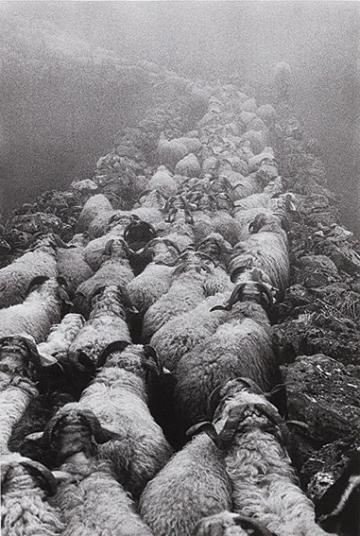
Édouard Boubat
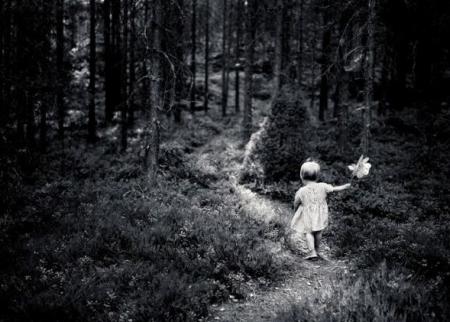
When a child a child was
Ritva Kovalainen
via
_______________________
The Letters of William Gaddis (Stray Notes)
John Latta
(....)
—
William Gaddis writing to Donn O’Meara and William Carnahan (19 November 1993), quoting the opening lines of Tennyson’s “Tithonus” (1859):
And here The woods decay, the woods decay and fall, / The vapours weep their burthen to the ground, / Man comes and tills the field and lies beneath, / And after many a summer dies the swan . . . literally, literally; & did I ever mention that a ½ century ago I changed my middle name on Harvard’s transcripts from ‘Thomas’ to ‘Tithonus’ there conjuring the day when through Eos’ intervention I’d secure immortality forgetting, in our lust, to stipulate eternal youth, until the day comes round (Here at the quiet limit of the world) when, pitying, the Dawn to the rescue has him transformed into the grasshopper with its relentless immortal tdzzzk, tdzzzk, tdzzzk . . .
(Thus in Agape Agape: “. . . where there is no present moment but only the next one being devoured in the immense maw of the past, where immortality finds its home at last, where the voice has dwindled to the dry scratch of a grasshopper . . .”) (Too, there’s the implacable dry scratch of Gaddis’s humor: I think of a remark regarding a somewhat unlavish room in Rome, that its simplicity’d nevertheless “provide refuge from that operatic people while we sample their remains . . .”)
—
...(more)
_______________________

photo - mw
_______________________
Franeois Laruelle: Principles of Non-Philosophy
Translated by Nicola Rubczak and Anthony Paul Smith
from the introduction
(....)
If philosophy has only been and only ever will be an opinion and a poorly thought out passion, then the question is of passing from its state of war and of competition, a state of exploitation of thought and as such of man, to its civil state, which we want to call human and democratic. This democratic humanization is one of the objectives—if there are any—of non-philosophy and perhaps even the only objective, if we decide to put the Real at the heart of man or man at the heart of the Real rather than one at the periphery of the other as philosophy itself does. The tradition has up to the present been the universal element of philosophical decisions: a true Kampfzeit as much as a Kampfplatz. To the tradition as this space-time of philosophical combat, we will oppose the non-philosophical translation of philosophies in a new universal outlook, in an egalitarian order, as far from “difference” as from nihilism which is its residue. There is an absolute untranslatable—the Real—before every translation, condemned moreover by the Real to its foreclosure. But for all that, it allows the translation of philosophies through their transcendental equivalence or their relative autonomy, non-philosophy itself, outside of which the philosophical state- ments remain that which they are, but within which they are translated together in “equivalent” statements with regard to the Real. Non-philosophy is the universal dictionary of philosophies; the transcendental idiom in terms of thought which relates to them. A pragmatic of the translation of philosophical decisions, it looks to discover and invent all the conditions of universal peace: rather than through treaty, through the constitution of an idiom of the identity of thought. Only a “language” capable of this feat of positing the multiplicity de jure, non-empirically, of philosophies, can also introduce peace into thought by means of democracy.
Do we fight here against the presumption of philosophy by that which will be taken as a new presumption, to know that non-philosophy is the thought that philosophy merits and that philosophy cannot find in itself, or in its own resources? Philosophy has become a new gamble between… philosophy and non-philosophy; between itself and the Real. We know the question: who will educate the educator? It is an infinite regress: who philosophizes philosophy? But philosophy cannot really and rigorously think itself; it can reflect upon itself, meta-philosophize itself, it cannot invent a totally other thought which would not be to some extent a double or a reflection of itself. It goes as far as dialectic or deconstruction, which is to say as far as these absurdities: post-philosophy, post-metaphysics, but it never renounces its ultimate authority over the Real, even when it accepts limiting and sometimes deconstructing this authority. The problem is formulated thus: what should we do not philosophically (a not more or a not less…)—with a philosophy, through the eventual means of such an other, but what should we make of Philosophy itself? Not philosophy taken “globally”, “generally” or “totally”—we do not claim here to leave it, but rather never to have entered into it—but of Philosophy related to its identity? Who can determine it; who can make a good use of it if it is no longer the philosopher himself? Who posits the multiplicity of philosophical decisions given that the philosophers most enamored with multiplicity, that of Being or even that of Becoming, are wary of positing a multiplicity of philosophies themselves, which will no longer be clois- tered by their philosophies, but which include multiplicity in a general manner. Non-philosophy is not exactly the educator of philosophy; it is the “subject” who receives it and transforms it, the force-(of)-thought as subject of non-philosophy and for each philosophy. What is the subject of the reception of philosophies if not every man, as in, each-and-every? Furthermore too often, philosophy looks to impose itself authoritarianly over man (through a so-called philosophical education) who it claims to transform with a view to adapting them to this reception. To this selection of man by the philosopher, and of the philosopher by philosophy, we oppose the induction and deduction of non-philosophy between the real-Man and philosophy: either real man given as “first term”, abstracted from its philosophical condition, or as untransformable through philo- sophical technology—what will result of this for philosophy itself, which is transformable? Rather than modifying man, non-philosophy modifies philosophy. Rather than giving itself philosophy and authoritarianly subsuming man, it does the opposite, and more than the opposite: do we not leave man as being-given, that is, deduced for philosophy?
(....) pdf available at Monoskop
_______________________

Earth holds them all
North Saskatchewan
Ritva Kovalainen
_______________________
The Truth in the Mirror
Paolo Lagazzi
translation by Nicholas Benson
(....)
As time went on and no one came to help him, Luis Maldonado, the famous cabaret artist, felt increasing anxiety. Was it possible that the idiot he’d spoken with hadn’t budged yet? Was it so difficult to call the police? On top of everything else, the air was becoming much too warm in there, it was suffocating, almost unbreathable…
Luis, however, was not without resources; the hypnotist’s art required steady nerves and a steel will. Fixing his gaze on himself in the mirror that took up an entire side of the elevator, the man decided to exercise his hypnotic power on himself in order to instill calm.
He had no sooner begun to stare into his own eyes, however, than the strange impression came over him that it was not his own face looking back, but the face of someone else: an unfamiliar, scowling man. Luis went on looking intently because he knew that only anxiety could distort the precision of his sight; if he were successful in applying the usual power of his gaze, “the other” would weaken and fall under his influence: and at that same instant, his own mind would be set free, at peace, relaxed. In reality the other man seemed to have no interest at all in conceding: the more the artist persisted in his effort to dominate him, the more the other seemed to become practically ferocious, and certainly more powerful than him.
...(more)
frankmatter
editorial collective: Nick Benson, Robert Margolis, and Frank Matter
"frankmatter publishes concert, performance, and book reviews, poems, translations, excerpts from novels, stories, plays, graphic novels, photographs, essays, marginalia, found art, & correspondence from all over
frankmatter is especially interested in dispatches from/about places & literatures that are overlooked, lesser-known, or misunderstood, cross-genre & genre-convention-bending work, micro and oral history, and the documentary"
_______________________
English and All That
Martha Rosler responds to Alix Rule and David Levine's "International Art English"
e-flux
(....)While I reserve the right to consider the original article as an elaborate joke, one hardly needs to be reminded that jokes are often a cover for hostility, and the more elaborate the joke, the more powerful the hostility may be. Furthermore, jokes are often intended to forge an alliance between the teller and the listener, at the expense of the butt of the joke. It’s one thing to critique double-talk as gobbledygook, a meaningless jumble of memes and phrases. It’s another to shine a negative spotlight on the word salad as a way of proving that theoretical discourse, or the very enterprise of theory, is a sham and a shame, a foreign import, or perhaps simply a fallen discourse.
(....)
What struck me most forcefully about the article was that it churned up enough interest among the chattering class to provoke some members to imagine that the mandarins have something at stake in linguistic ornaments, and that they themselves have something to defend. Given the attacks on the humanities and their funding, those in the art world (and the “human sciences,” including sociology) would, one might think, be more circumspect about picking up some of the tools of the delegitimators, such as statistical analysis.
...(more)
e-flux 45
_______________________

Dreams That Money Can Buy
(1947)
produced, and directed by surrealist artist and dada film-theorist Hans Richter
Collaborators included Max Ernst, Marcel Duchamp,
Man Ray, Alexander Calder, Darius Milhaud and Fernand Léger.
youtube
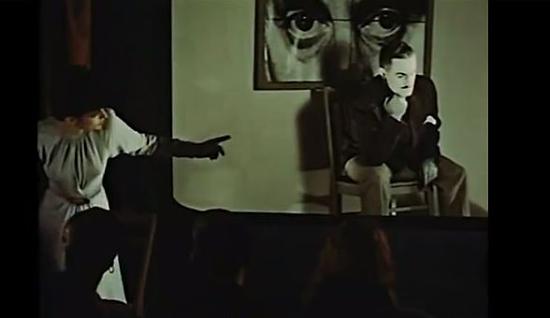
_______________________
Bitcoin
Michael Betancourt
ctheory
(....)
The Bitcoin proposal does more than eliminate human oversight and legal restrictions from the circulation of exchange values. It is an attempt to replace existing, formally organized, legal systems of protection for all parties in the transaction -- the buyer, the seller, and the bank -- with one based upon the assumption that the only parties to a transaction who need protection are sellers: this structural bias further reifies the same capitalist ideology that gives rise to digital rights management (DRM) in the transformation of everything that can be digitized into a digital form (the universal aspiration to the state of information). The only parties who have significance in such a framework are the owners (sellers) whose decisions about how to limit access find literal form in the DRM itself. Bitcoin is the reification of these interests at the level of exchange itself; this aspect of Nakamoto's proposal has contributed to its embrace by grey and black markets (such as Silk Road) employing peer-to-peer exchanges where getting paid can be an issue. This embrace is ironic since it is a currency that inherently contains the ability to track all ownership and transactions. Unlike physical currency of all types, and in a fashion distinct from existing systems of exchange, Nakamoto's description of Bitcoin eliminates the privacy afforded to purchases:
We define an electronic coin as a chain of digital signatures. Each owner transfers the coin to the next by digitally signing a hash of the previous transaction and the public key of the next owner and adding these to the end of the coin. A payee can verify the signatures to verify the chain of ownership.
(....)
The valorizing process of capitalist expansion enabled by digital technologies is immediately apparent in the surveillance component inherent to Bitcoin. A further irony emerges from its lack of engagement with the formal banking system: Bitcoin lacks a formal system of recourse when problems of coin ownership, transaction validity, etc. do arise precisely because it is outside established legal frameworks. By creating this "private" currency, outside of the legal and historical framework of governmental regulation and management of currency, Bitcoin is an ideological reification of globalized capitalism, and should be recognized as a tool whose alignment with authoritarian values has been masked by how the ideology of automation intersects with the aura of the digital: instead of being a "free" or "independent" form of money that transcends national boundaries, it is a technology of control aligned with globalized concerns over economic surveillance and monitoring the behaviors and associations of consumers' behaviors in the physical world.
...(more)

Canal Under the Moonlight
Shoda Koho
1871 - 1946
Ukiyoe-Gallery
_______________________
From Having and Space
Thibault Raoult
Only so many times you can rotate, opt out of whippoorwill.
Arrange the shore, e-a colle.
There’s a cost to putting a face on it.
With traitor frozen, we have every chance.
People use their forms to swing.
At some point I want to see some skin.
Gello’s skins.
Pyotr never repeats himself.
Problematic because he’s in charge of the waterslides.
Is there a root in there somewhere?
....
The hedges are coming!
You wish you were implicated.
All this hiccup, and nowhere to go.
How can they remember all the shapes they’ve been associated with?
Teaching has forced me to be utter, clear to the massing.
...(more)
_______________________

Historia Abscondita [pdf]
An Index of Joy
Compiled from Friedrich Nietzsche’s
‘The Gay Science’
Translated by Walter Kaufmann
Every great human being exerts a retroactive force: for his sake all of
history is placed in the balance again, and a thousand secrets of the past
crawl out of their hiding places—into his sunshine. There is no way of
telling what may yet become part of history. Perhaps the past is still
essentially undiscovered! So many retroactive forces are still needed!
E P C digital library
_______________________
SINGLES 2005-2013
(from Yudu)
Adam Fieled
As/Is
#1345
Two hedgerows with a little path
between — to walk in the path like
some do, as if no other viable route
exists, to make Gods of hedgerows
that make your life tiny, is a sin of
some significance in a world where
hedgerows can be approached from
any side — I said this to a man who
bore seeds to an open space, and he
nodded to someone else and whistled
an old waltz to himself in annoyance.
from Apparition Poems
_______________________
Pathways — Spring 2013
A magazine on poverty, inequality, and social policy
_______________________
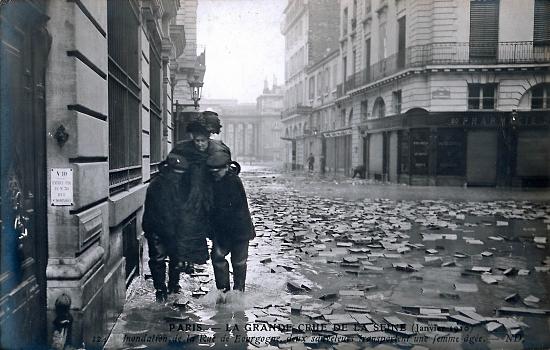
the flood of 1910
From the water to the Sahara
Catherine Darley
Poemas del rko Wang
_______________________
Abjection & Bodies Adrift
interview with Arthur Kroker
video
synthetic_zero
_______________________
Arguing about Justice: Essays for Philippe Van Parijs
Axel Gosseries
This volume is a gift for Philippe Van Parijs, a tribute to his work and friendship. The Hoover Chair in economic and social ethics, which Philippe has led since its inception in 1991, turned 20 this year, while the Basic Income Earth Network (BIEN), which he co-founded in 1986, turned 25. During this same year, he published two new books, one a collection of essays entitled Just Democracy (ECPR Press), and the other a long-awaited monograph entitled Linguistic Justice for Europe and for the World (OUP). He also received the Belgian Ark Award for Free Speech, a prize created in 1951 by Flemish intellectuals opposed to restrictions on freedom of expression. On top of that, 2011 happens to be the year of his 60th birthday. We had to do justice to such a convergence of circumstances - especially to the latter.
We thought Philippe would prefer a book to a cake. Academia.edu
_______________________

Under the dump, Rivington Street
How the Other Half Lives: Studies among the Tenements of New York
Jacob Riis
(1890)
full text
_______________________
“Not for All the Tea in China!”
Political Ideology and the Avoidance of Dissonance-Arousing Situations
H. Hannah Nam, John T. Jost, Jay J. Van Bavel
(....)
Even a cursory analysis of the political landscape in the contemporary United States reveals that there are vast differences in the cognitive and rhetorical styles of liberals and conservatives – as reflected, say, in the differences between National Public Radio and Fox News or Jon Stewart and Rush Limbaugh. Increasingly, ideological polarization is the norm, and little or no common ground exists between liberals and conservatives when it comes to social and economic issues such as tax policy, the debt ceiling, health care reform, gay marriage, and climate change. Undoubtedly, ideological conflict is fostered (at least in part) by institutional, system-level processes, such as electoral competition between political parties and the organized activities of lobbyists. At the same time, there is growing evidence that differences between liberals and conservatives are shaped by psychological variables having to do with personality, cognition, emotion, and motivation – all of which may help to explain why the preferences and styles of liberals and conservatives often diverge.
(....)
If there are indeed ideological differences in the tendency to avoid dissonance-arousing thoughts, as our data suggest, this may also help to explain why conservatives are more prone to engage in biased forms of moral reasoning and more likely to hold false beliefs concerning a number of public policy issues, in comparison with liberals. Nyhan and Reifler observed how liberals and conservatives would respond to the presentation of evidence contradicting their prior (incorrect) beliefs. They found that conservatives exhibited a “backfire effect,” reporting even stronger commitment to their initial beliefs after being exposed to discrediting evidence. Liberals failed to correct their initial misperceptions in the face of disconfirming information, but they did not exhibit a backfire effect.
...(more)
PLOS One_______________________
Society of Addiction: Capitalism, Dopamine and the Consumer Junkie
Nicholas Powers
_______________________
Special Issue: The Citizen-Subject
Guest Editors: Jennifer Greiman and Kir Kuiken
Postmodern Culture
Volume 22, Number 3, May 2012
_______________________
Life at the Bottom: The Worldview That Makes the Underclass
Theodore Dalrymple
scribd
_______________________
Deleuze & Guattari and Minor Marxism
Eugene W. Holland
Laws, Exceptions, Norms:
Kierkegaard, Schmitt, and Benjamin on the Exception
Rebecca Gould
SelectedWorks
— A research announcement tool to maximize the readership and impact of your work
_______________________

Moonlit Sea (#8)
Shoda Koho
_______________________
Mary Margaret O’hara:
The Eccentric Canadian Cult Songstress With The World’s Most Devoted Fanbase
Dangerous Minds
via Nag on the Lake
_______________________
On writing (and not writing)
rob mclennan
(....)
Some days are Orpheus: I can’t look back, for fear of losing everything.
I attempt to sharpen a book about my late mother, attempt to complete a collection of short stories. I aim for completion somewhere over the next six months; perhaps a year. I am attempting to write about that which I do not yet know.
I sometimes feel in such a hurry I haven’t even time to mention it.
There are days I require to put all aside, and simply read. These are becoming more prominent. These are grounding, rejuvenative. Distractions that do not take away from the work, but instead become the work.
...(more)

Still Life and Street
1937
M.C. Escher
b. June 17, 1898
_______________________
Agnomia
Róbert Gál
transl. from the Slovak by Michaela Freeman
exquisite corpse
(....)Why do we so stubbornly look for locks in all, that is also in opened, doors? This is also one of the questions regarding Bunuel and his The Exterminating Angel. Couldn’t the existence of a lock on an opened door alter the status of its openness? And so on. To create a culture means in most cases to be necessarily acultural. For why does a creator for the purposes of his creation need to know what others create? A widespread groping is sufficient for a creator, as he knows very well, that no groping – even the broadest – can be bankless or else it would spill into something else. The role of the creator is to sustain the spilling within one’s own character of what it is, while preventing it to really spill into something else. We’re therefore dealing with a permanent maintenance of the desired flow, which, for this reason, ultimately becomes thoughtful. Thoughtful in the sense of tautology, that is indisputable. Thoughtful in the sense of the realization of the act of thought, the context of which is the flow of that being thought, continually melted into the flow of thinking. This is not philosophy, dear friends, but a gradual process of creative undertaking with a jackhammer in hands. The creator is more of a worker than an intellectual. A man forced to observe is learning to observe; a circle in a circle repeatedly burst like a bubble. Lifted lifts? The lure of traps, where even traps themselves fall in.(....)
(And to what degree is it necessary to provoke the requirements of a loved one, when it comes to the change of a being while the being is just being changed?) To come out with the feelings as if the internal feelings were hiding something. Command denial of desire which isn’t based on anything, nor is it justified by anything. The emptiness, which frightens in a moment, is chopped by a structure of the net and by the structure of breathing in it. Empty cans of what’s been drunk rattle through the street of static sculptures of the just restored. The looks of tourist children, their braying photo cameras, which take what was, angels included, and necessarily transform it into other materials. Time shifts between expectations and disappointments is unsteady, almost invisible. This is an annihilation of sun and other such hermits. This is a tautology of every moment, as if every moment was necessarily a tautology.
...(more)
Róbert Gál - Agnomiaa review by Damian Kelleher
_______________________

Puddle
M.C. Escher
1952
_______________________
The Far North of Experience
In Praise of Darkness (and Light)
Rebecca Solnit
(....)
Sometimes during that summer when the sky was often gray but never black, I would think that a task had to be done before darkness and then realize that there would be no more darkness while I was there, and it didn’t matter so much when I rose, when I slept, when I traveled. For me day and night were time itself, and I missed the rhythm and structure they provide. I missed stars. Darkness no longer shut me in: I shut light out to sleep. It was as though I had entered a landscape that itself never slept, never dreamed, that never let up the rational alertness of daytime, the light of interrogation and analysis.
The sensuality of night had never been so clear to me, darkness descending like velvet to wrap around you and enclose you in its black cocoon, to take you to your other self and others. In darkness dreams awaken and dreamers merge, which might be how passion becomes love and how making love begets progeny of all natures and forms. Merging is dangerous, at least to the boundaries and definition of the self. Darkness is generative, and generation, biological and artistic both, requires this amorous engagement with the unknown, this entry into the realm where you do not quite know what you are doing and what will happen next.
(....)
When you spend time in the desert, you come to love shadow, shade, and darkness, the respite they give to the menacing blaze of day that burns you out and dries you up. Heat is the desert as predator, just as cold is the Arctic’s biggest animal. Desert light is fierce, and at midday it flattens everything into a harsh solid, but early and late in the day, light is golden and every crevice and fold and protrusion of the landscape is thrown into the high relief of light and shadow. At those times day and night intertwine like dancers, like lovers, and shadows are as powerful a presence as the things that cast them, or more so, growing and growing until the sun disappears below the horizon and darkness spreads like water on the land.
...(more)
_______________________
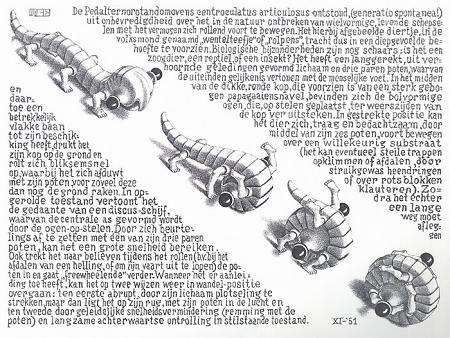
Curl-up
M.C. Escher
1951
_______________________
Disciplining Terror: How Experts Invented 'Terrorism'
Lisa Stampnitzky
google books
pdf available at Monoskop
_______________________
Prism, privacy and politics with a small p
A background to the NSA leaks with links to further reading
Eurozine
_______________________
“My thinking with regard to the new takes its bearings from German theorist Theodor Adorno, who likens the new to “a child at the piano searching for a chord never previously heard.” Despite the seemingly utopian disposition of this search, Adorno is aware there is no such thing as music “never previously heard”; chordial combinations are “limited” and “everything that can be played on [the keyboard has already been] implicitly given.” In other words: the keyboard offers both prospect and prohibition. One locates the new, therefore, not in the music itself, but in an unending and open-ended processes—informed by desire—of searching: “the new”, says Adorno, “is the longing for the new, not the new itself.” For me, what desire for the new translates to, on the one hand, is an endeavor to come to terms with the history of my chosen form (poetry). I’d like to know how poets from various localities and periods engaged with their givens: how they accepted yet disputed the limits and possibilities of language, in general, and poetry’s formal features, in particular. On the other hand, longing for the new also means an awareness of, and involvement in, the contemporary contexts in which possibilities of poetry might be simultaneously generated yet foreclosed: a knowledge of—and an ability to produce something from—the conflicts and affinities poetry has with society, culture, politics, the economy, and with itself. Though the poet John Keats privileged “heard melodies,” he valued even more “those [that are] unheard”: the new in poetry resides precisely in the poet’s ability to create conditions that make it possible for works to emerge: works which, at present, are still at the edge of listening, in danger of being silenced, yet desiring to be heard.”
— Vincenz Serrano
Transit
Issue 1: "The new dwells in possibility."
_______________________
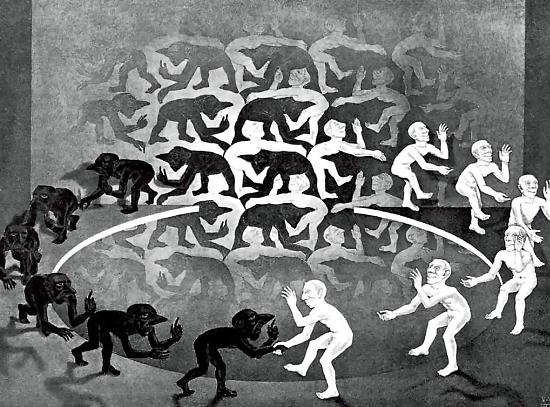
M.C. Escher
_______________________
Afterlives “unfolding”:
figures of afterness at the Conference on Ecopoetics
Angela Hume
I have been thinking about afterness, ecopoetics, and ecological crisis. What does it mean to come after? After Katrina? After the BP blowout? After 400 parts per million? After what the philosopher Ray Brassier calls “the fact of extinction” itself? What might it all mean for poetry and poetics? In Evelyn Reilly’s words, it’s possible that “we are in a moment of…more and more poetry [relating] to the ecological, that, in an inverse of ‘no poetry after Auschwitz,’ we are in a moment of ‘all poetry after Katrina,’ or the Deepwater Horizon, or Sandy or whatever it is that comes next.” Moreover, what do affective states or feelings of afterness have to do with contemporary environmental conditions and crises? What do they have to do with cultural memory, with grief and mourning, with revolutionary thinking and activity?
...(more)
|











































